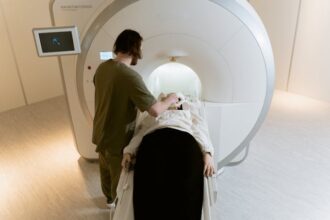Imagine the frustration of slowly losing the ability to express yourself, not due to a lapse in memory but because the words you wish to say stubbornly refuse to be spoken. This is the harsh reality faced by those afflicted with primary progressive aphasia (PPA), a relatively uncommon form of dementia that typically manifests in middle age and gradually deteriorates language abilities over time.
At the University of Chicago Medicine, a team of dedicated researchers is shedding light on the challenges encountered by individuals with PPA and are pioneering accessible treatment options. Their recent publications offer new insights into the substantial effect PPA has on quality of life and highlight the viability of telemedicine interventions on an international scale. This breakthrough might revolutionise care delivery and influence policy decisions.
PPA stands distinct in the spectrum of neurological disorders because it predominantly impairs language skills, unlike the more familiar Alzheimer’s dementia, which initially affects memory. Emily Rogalski, PhD, the Rosalind Franklin PhD Professor of Neurology at UChicago and a prominent figure in this research area, emphasises that PPA is often neglected in academic studies due to the difficulty in gathering large participant groups, which can obscure the true breadth of lived experiences.
Moreover, Rogalski points out the frequent oversight of PPA in clinical settings, particularly among individuals from lower socioeconomic backgrounds, leading to underdiagnosis and, consequently, a lack of appropriate care. This issue is compounded by the geographical and financial barriers many face when seeking specialised medical advice and treatment.
PPA’s early onset poses unique challenges. Rogalski notes, “Individuals with PPA are often still active in their careers and may be caring for young children at home.” This affects the patients and places a substantial burden on their families, affecting familial relationships and economic stability.
Rogalski and her team utilised the Health Utilities Index (HUI) to understand how PPA affects daily life. This well-established tool assesses various aspects of well-being, such as physical capabilities, emotional health, and cognitive functions. The findings confirmed the severe impact of PPA on health-related quality of life, correlating more significant language impairment with lower quality of life, particularly affecting hearing, sensation, cognition, and speech abilities.
Thomas Hopkins, PharmD, MS, the study’s lead author, explained that the research aimed not only to gather detailed data on the quality of life for those with PPA but also to enable direct comparisons with other diseases. This generic measurement tool is invaluable for policymakers and health resource allocators, ensuring comprehensive, comparative health metrics inform decisions.
This quality-of-life data is crucial for influencing decisions regarding research funding, insurance regulations, and disability coverage. It equips researchers, patients, and their families with the evidence needed to advocate for more substantial support and resources.
Concurrently, Rogalski and her colleagues have been exploring the potential of telemedicine in delivering speech-language therapy to PPA patients, a method that transcends geographic and economic barriers. Their study successfully enrolled 95 pairs of PPA patients and their primary caregivers from four countries, demonstrating the feasibility of using remote recruitment and video chat interventions.
This successful deployment of telemedicine facilitates equitable care and sets a potential model for future research and interventions across various dementia syndromes and conditions. Rogalski envisions this framework as adaptable for broader advocacy and intervention strategies.
Despite the lack of a cure for PPA, the role of care partners in these studies is pivotal. They provide essential perspectives on the everyday challenges and diverse needs that span family dynamics and various life situations, giving families a platform to voice their experiences.
Although challenges in diagnosing and treating PPA persist, and no curative therapy has been developed, these research advances offer hope and practical support to affected families. Rogalski passionately advocates for enhancing aspects of daily life that can be controlled, such as independence, emotional well-being, and confidence, while the search for pharmacological solutions continues. This approach provides hope and practical aid to those navigating the difficult journey of PPA, reinforcing the belief that improving quality of life in tangible ways is equally as crucial as pursuing a medical cure.
More information: Emily Rogalski et al, Communication Bridge-2 randomized controlled trial: Recruitment and baseline features, Alzheimer’s & Dementia. DOI: 10.1002/alz.14168
Journal information: Alzheimer’s & Dementia Provided by University of Chicago Medical Center








